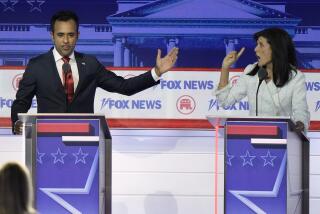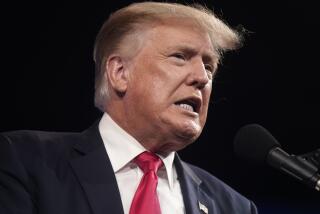Clinton Takes Aim at Bush’s Iraq Strategy : Politics: President ‘coddled’ Hussein and refused to aid his internal foes, Democratic candidate says. Criticism turns up heat in foreign policy feud.
CHICAGO — Escalating his feud with President Bush on foreign policy, Bill Clinton demanded Tuesday that the Republican incumbent explain why he pursued strategies in the Persian Gulf War that left Iraqi leader Saddam Hussein in power.
The Democratic presidential nominee, bristling at White House insinuations that he is unprepared to handle the nation’s international affairs, charged that Bush “coddled Saddam Hussein right up until the war.”
Referring to the U.S. refusal to assist rebel groups in Iraq after the war, Clinton also told reporters that “as soon as the war was over, (Bush) . . . didn’t help the Kurds and he didn’t help the Shiites and he gave the clear signal that Saddam Hussein was America’s choice to stay in power over there.”
The comments by the Arkansas governor were part of a concerted effort by the Democratic ticket to respond aggressively to a Republican attack on its foreign policy credentials.
Clinton’s running mate, Tennessee Sen. Al Gore, blasted the Administration at a separate campaign stop in Atlanta earlier in the day. And even former President Jimmy Carter got into the act. Appearing with Gore, Carter contended that Bush’s reputation in foreign affairs has been overrated.
The Democratic gibes followed Republican sniping at Clinton for his assertion that the nation should adopt a more aggressive role in solving the crisis in Bosnia, the former Yugoslavian republic.
In taking aim at Bush on past policies toward Iraq, Clinton made clear that he supports current U.S. and United Nations actions meant to force Hussein into complying with the sanctions put in place when the Persian Gulf War ended.
But his criticism, issued in harsher language than he has used in the past, focused on Bush Administration actions leading up to and immediately following the war, and struck at the heart of the President’s strongest suit--foreign policy.
“I don’t want to politicize this, but if they want to play politics with it, they need to explain why they were giving loan guarantees to Iraq right up to the edge of the Gulf War,” Clinton said. “And why, as soon as the war was over, (Bush) wouldn’t do what (Army) Gen. (H. Norman) Schwarzkopf wanted and spend another day and a half to destroy 700 tanks and he (Bush) just let the poor Kurds and the Shiites twist.”
The tempest stemmed from the weekend release of a statement in which Clinton advocated assertive action to protect starving citizens in Bosnia. In the statement, Clinton suggested that the United States take the lead in securing U.N. approval for air strikes against the Serbs who have been attacking the relief effort.
On Monday, White House spokesman Marlin Fitzwater called the statement “the kind of reckless approach that indicates (Clinton) better do some more homework on foreign policy.”
In defending himself Tuesday, Clinton said: “I’ve worked out a coherent foreign policy. I’ve devoted more attention to it than any other candidate in the primary process.”
He acknowledged that his proposal that the United States press for U.N. approval of possible air strikes in Bosnia went beyond the Administration’s position.
“But I think it’s where they’ll probably have to go, unless they just want to give up the relief effort,” he said. “I didn’t say we should (begin air strikes), but it’s something we shouldn’t rule out unless you just want to give up the relief effort.”
Gore, campaigning in Georgia, quickly signaled that the Democrats are not prepared to concede foreign policy expertise to their Republican foes.
“If President Bush and Vice President (Dan) Quayle are such whizzes in foreign policy, why is it that Saddam Hussein is thumbing his nose at the entire world?” Gore asked.
He also sought to portray Fitzwater’s criticisms as arising from an atmosphere of political desperation.
“They are in a state of extraordinary political panic in the White House, and it’s not a pretty sight,” Gore said.
Carter, at his joint appearance with Gore, struck an angry chord in denouncing the Administration’s foreign policy record.
“I don’t really believe that the Bush Administration has done anything in the last four years to demonstrate superiority,” said Carter, who lost his 1980 reelection bid to Ronald Reagan in part because of public discontent over his handling of the Iranian hostage situation.
Mark Gearan, a Clinton campaign aide now traveling with Gore, rejected the notion that it could be politically risky to have Carter echo criticisms of the Republicans on the foreign policy front. “People see Jimmy Carter as a force for bringing the country together,” Gearan said.
Somewhat paradoxically, this week’s dispute over foreign policy issues arose after days in which Clinton was vocally supportive of Bush’s recent handling of Iraq’s refusal to allow U.N. weapons inspectors into a Baghdad government building.
And Clinton began Tuesday with rather benign remarks, asserting that Republicans and Democrats should work together to solve the world’s problems.
“I don’t think either side should play a lot of politics with this country’s foreign policy. We ought to be working to develop bipartisan foreign policy,” he said. “We ought to agree when we can, we ought to disagree when we have to--on the merits--and our attention ought to be turned to the incredible problems of America here at home.”
But his remarks evolved into his strongly worded reproof when he arrived in Chicago from San Francisco, where he spent Monday night.
For its part, the White House on Tuesday declined to follow up on its Monday assault.
Fitzwater expressed gratitude for Clinton’s support of the Administration’s policy in the current dispute with Iraq. And he declined an opportunity to repeat the harsh criticisms he had uttered the day before, saying: “I don’t know that I want to relive the golden moments of yesterday.”
The attack on Clinton on foreign policy--an area once thought to be indisputably Bush territory--appeared to reflect growing Republican concern about the Democratic candidate. Clinton has surged to large leads over Bush in national public opinion polls in the two weeks since the Democratic Convention.
In an effort to stall Clinton’s momentum, Administration officials are following two courses. One is to plant doubts that Clinton, a five-term governor with no hands-on experience in foreign policy, is equipped to handle the nuances of international diplomacy.
Administration officials are also pressing the notion that Clinton, who contends that the nation has to have the “courage to change,” represents an unnecessary risk for the country.
“Change has a flip side, and it’s called trust,” Bush told voters during a Midwest campaign trip on Monday.
Clinton on Tuesday bridled at the suggestion that he was not trustworthy, aiming his fire at the President’s much-publicized promises at the 1988 Republican National Convention.
“This is the guy that said ‘Read my lips’ (in a pledge not to raise taxes), and he wants us to trust him,” Clinton said derisively. “This is the guy who said he would stick up for the forgotten Americans and as soon as he was elected he forgot them again.
“I think we can trust him to carry out the same old failed policies that benefit only the rich and let this country go downhill,” he added.
Clinton rarely discusses foreign affairs at his campaign events, largely because of his campaign’s determination that the economy will be the make-or-break issue of the 1992 election year.
But Clinton has delivered two major policy addresses during his campaign, both of which underscored a moderate approach to foreign policy that was peppered with specific criticisms of Bush.
At one speech in April, the Democrat accused Bush of overseeing a “reactive, rudderless and erratic” foreign policy. Bush, he said, had been too slow to help the Soviet Union and too quick to make up with China after the Tian An Men Square killings.
Since then, he also has criticized the President for refusing to allow Haitian refugees entry into the United States.
But Clinton has also distanced himself from Democrats who reflexively oppose the use of force, as his statements on the turmoil in Bosnia demonstrated this week.
Clinton has asserted throughout the campaign that he supported the Gulf War, but his allegiance to that cause may arise as an issue in future months.
The GOP campaign may focus on comments he made days after Congress approved a resolution allowing the President to use force in the Persian Gulf in early 1991. At that time, Clinton was quoted by Arkansas reporters as saying that he agreed “with the arguments of the people in the minority of the resolution--that we should give sanctions more time and maybe even explore a full-scale embargo” before going to war.
Times staff writers Sam Fulwood III, in Georgia, and Douglas Jehl, in Washington, contributed to this story.
More to Read
Get the L.A. Times Politics newsletter
Deeply reported insights into legislation, politics and policy from Sacramento, Washington and beyond. In your inbox three times per week.
You may occasionally receive promotional content from the Los Angeles Times.











